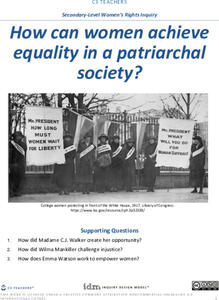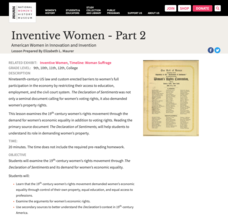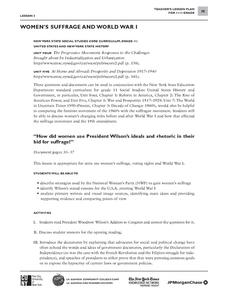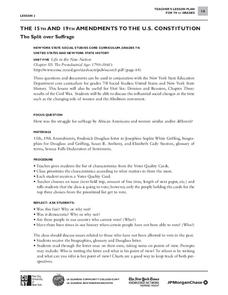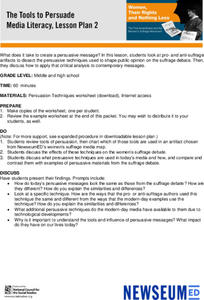Curated OER
Introduction to Reform Movements of the 1800s
Eleventh graders consider the impact of reform movements of the 19th century. In this Progressive Reform lesson plan, 11th graders examine documents and images associated with women's suffrage, prohibition, and labor reform. Students...
Curated OER
Susan B. Anthony & Women's Suffrage
Students explore the life of Susan B. Anthony and Victorian views on women's suffrage. After discussing the suffrage movement, groups of students observe lithographs and discuss reasons for Miss Anthony's arrest. They read a petition...
Curated OER
Women's Suffrage - Honor a Suffragist
Students consider how the Suffrage Movement impacted women. In this women's rights lesson, students visit selected websites to discover information about suffrage and suffragists. Students conduct further research on the suffragist of...
DocsTeach
Suffragist Susan B. Anthony: Petitioning for the Right to Vote
What is the best way to get a point across: a petition or a protest? Using primary sources, including a petition from Susan B. Anthony and a photo of a White House protest from the early 1900s, young historians examine what women did to...
C-SPAN
Choice Board - Conversations with Suffragists
Celebrate 100 years of women's suffrage by planning a re-enactment of famous women discussing their fight. After learners view a series of interviews with famous women played by actors, including Susan B. Anthony, Sojourner Truth, and...
Curated OER
Women's Achievement Quiz
How much do you or your class know about various achievements made by women thorughout history? Here is a set of 10 questions with answers all related to the accomplishments of women in science, politics, civil rights, and law.
National Endowment for the Humanities
Women's Lives Before the Civil War
Women's lifestyles before the Civil War made a huge impact as a point of causation. Give middle schoolers the opportunity to view firsthand the lives of women before the Civil War. They analyze primary source documents, view photographs,...
Curated OER
Woman Suffrage in Colorado, 1877-1893
Students work together in groups to examine the suffrage movement in Colorado. They analyze the reasons for and against women's suffrage. They also determine the impact of the movement in Colorado.
Curated OER
Women's History Quiz
Explore the contributions that women have made throughout American history. Here are 10 questions that take learners through time, stopping to recognize various accomplishments women have made along the way. The online worksheet includes...
National Woman's History Museum
The Road to Suffrage
Scholars each research a different entry on the included suffrage timeline that lead to the ratification of the 19th Amendment. Using a minimum of three sources, investigators add what they have learned to a combined class Suffrage...
National Woman's History Museum
The National Woman’s Party
Two parties led the women's suffrage movement. The National American Woman Suffrage Association (NAWSA) was a moderate organization while the National Women's Party (NWP) was more militant. Young historians investigate why members of the...
C3 Teachers
Call for Change: What Did It Take for Women to Be Considered “Equal” to Men in New York?
An inquiry-based lesson challenges fourth graders to examine who had voting rights in New York when it was founded, women's roles, and how they entered politics. Scholars participate in thoughtful discussions and show what they know...
C3 Teachers
Women’s Rights: How Can Women Achieve Equality in a Patriarchal Society?
Women today may not have heard of Madame C.J. Walker or Wilma Mankiller, and a few may not be aware of Emma Watson's current role; however, they have certainly benefited from their efforts. Using questions supplied by this guided...
US House of Representatives
Recent Trends Among Women in Congress, 1977–2006
After reading the contextual essay, "Assembling, Amplifying, and Ascending: Recent Trends Among Women in Congress 1977–2006," groups select a female senator or representative and research her background and contributions.
US House of Representatives
The Women of Congress Speak Their Mind
A picture may be worth a thousand words, but words can tell many stories. To conclude their study of the women who have served in the US Congress until 2006, groups analyze statements made by these remarkable women.
PBS
19th Amendment to the U.S. Constitution - Women's Right to Vote (1920) and Resource Materials
A facsimile of the 19th Amendment, a transcript of the amendment, a photograph of a suffragist march, and a background information sheet that details the struggle to get the amendment passed comprise a packet of resource materials...
National Woman's History Museum
Inventive Women - Part 2
The Declaration of Independence was published in 1776. The Declaration of Sentiments and Resolutions, modeled after the Declaration of Independence, was drafted and read by Elizabeth Cady Stanton at the Seneca Falls Convention in 1848....
City University of New York
Woman's Suffrage and World War I
How did women use President Wilson's ideals and rhetoric in their bid for suffrage? To answer this essential question, class groups analyze primary written documents and visual images.
City University of New York
The 15th and 19th Amendments to the U.S. Constitution
Who gets to vote? Learn more about struggles for suffrage throughout United States history with a lesson based on primary source documents. Middle schoolers debate the importance of women's suffrage and African American suffrage before...
Newseum
The Tools to Persuade
After reviewing persuasion techniques, young historians examine how a specific technique was used in the pro- or anti-suffrage messages. They then examine how that same technique is used in modern-day media messages.
National Woman's History Museum
Women, Propaganda, and War
Governments rely on propaganda to build support for wars. Class members examine six propaganda posters, two each from the Spanish-American War, World War I, and World War II, and analyze how the way women were portrayed in the posters...
Curated OER
The arly Suffragists
Students explore the suffragist movement through this futuristic lesson about the loss and creation of a commemorative stamp to honor a women's Suffrage Pioneer. The lesson takes us to 2080 and back to the 1800's to complete the tasks.
Curated OER
Women's Votes, Women's Voices
Learners investigate Women's Suffrage by analyzing images from the past. In this equal rights activity, students read biographical work about Emma Smith DeVoe, an activist who fought for women's rights. Learners view a comic style...
Curated OER
What is Suffrage? Understanding the Right to Vote
Students discover one of the restrictions forced on women of the early 1900s. In this civil rights lesson, students investigate suffrage and why women were not allowed to vote in the early twentieth century. Students create a mock...














